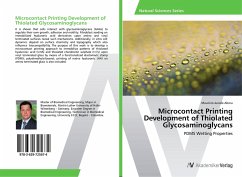
Microcontact Printing Development of Thiolated Glycosaminoglycans
PDMS Wetting Properties
Versandkostenfrei!
Versandfertig in 6-10 Tagen
24,99 €
inkl. MwSt.

PAYBACK Punkte
12 °P sammeln!
It is shown that cells interact with glycosaminoglycans (GAGs) to regulate their own growth, adhesion and motility. Fibroblast seeding on immobilized hyaluronic acid derivatives upon amino and vinyl terminated surfaces reveal such mechanisms. Additionally, in vitro cell dynamics depend on surface chemistry and topography which also influence biocompatibility. The purpose of this work is to develop a microcontact printing approach to immobilize patterns of thiolated hyaluronic acid (t-HA) and thiolated chondroitin sulphate (t-CS) upon vinyl terminated glass by means of a functionalized elastome...
It is shown that cells interact with glycosaminoglycans (GAGs) to regulate their own growth, adhesion and motility. Fibroblast seeding on immobilized hyaluronic acid derivatives upon amino and vinyl terminated surfaces reveal such mechanisms. Additionally, in vitro cell dynamics depend on surface chemistry and topography which also influence biocompatibility. The purpose of this work is to develop a microcontact printing approach to immobilize patterns of thiolated hyaluronic acid (t-HA) and thiolated chondroitin sulphate (t-CS) upon vinyl terminated glass by means of a functionalized elastomeric stamp (PDMS; polydimethylsiloxane); printing of native hyaluronic (HA) on amino terminated glass is also included.


